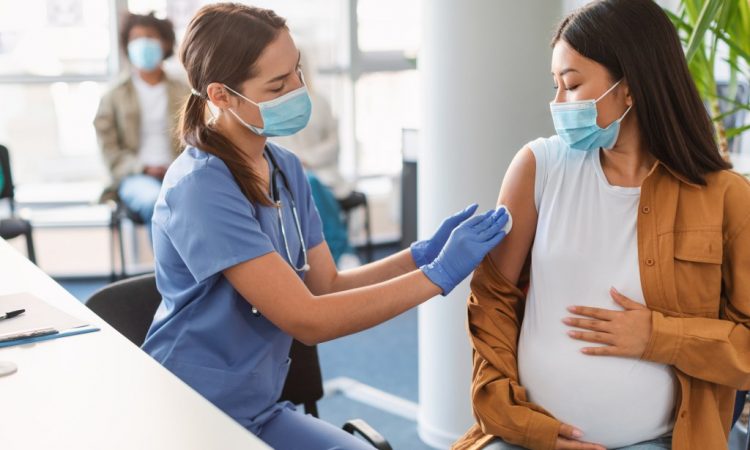The new RSV shots are here, and while older adults and infants are already approved for them, the Centers For Disease Control and Prevention (CDC) are now recommending the vaccine to a new group. Specifically, the CDC announced on Friday that pregnant people between weeks 32 and 36 of pregnancy should get the RSV vaccine Abrysvo to protect newborns from severe RSV.
The Food and Drug Administration (FDA) approved Abrysvo back in August. From there, it went to a CDC advisory committee, which voted 11-1 on Friday to recommend the vaccine to pregnant people, before the recommendation was officially approved by the agency. Abrysvo “is available in some locations in the U.S. and availability is expected to increase in the coming weeks,” the CDC said.
RSV (aka respiratory syncytial virus) is a contagious virus that targets the lungs and breath passages, causing cold- and flu-like symptoms like runny nose, coughing, fever, sneezing, and a decrease in appetite. Most people recover in a couple of weeks, but RSV can become serious, especially in infants and adults over 60, the CDC says. That’s why those groups specifically have been targeted for immunizations, along with pregnant people (in order to protect newborns).
Abrysvo, the vaccine just approved for pregnant people, is actually the second RSV vaccine and third RSV preventative treatment to be announced this year. Abrysvo and another vaccine, Arexvy, are approved for use in adults 60 years-old and up, while a monoclonal antibody treatment called Beyfortus has been approved for infants under 8 months and infants between 8 to 19 months who are at increased risk. (FYI: the vaccine and the monoclonal antibody both protect against severe RSV, just in different ways. While the vaccines stimulate your immune system to produce protective antibodies, Beyfortus contains already-made antibodies that provide protection right away, which is key for newborns with immune systems that are still developing.)
Abrysvo, the RSV vaccine for pregnant people, works by triggering the mother’s body to produce antibodies, which are transferred to the baby through the placenta. According to the CDC, the numbers look promising, with the vaccine shown “to reduce the risk of RSV hospitalization for babies by 57 percent in the first six months after birth.” When given within the 32 to 36 week window, the vaccine is shown to lower the risk of severe RSV symptoms by 91 percent within a baby’s first three months of life, according to clinical trial data.
In addition, if a pregnant person receives the vaccine, in most cases their baby will not need to receive the antibody. The exception, per the CDC, is if the maternal immunization occurs less than two weeks before the baby is born.
The vaccine’s side effects may include injection site pain, headache, muscle pain, and nausea, per JAMA Network. JAMA also noted that preeclampsia occurred in 1.8 percent of pregnant people who received the vaccine, slightly higher than the 1.4 percent who received a placebo. According to NBC News, “Pfizer has said it will monitor the risk of preterm birth and hypertensive disorders among vaccine recipients.”
On the whole, the RSV vaccine for pregnant people is a major opportunity to protect vulnerable newborns from this virus. It’s an especially important advance given the early and severe RSV surge the US experienced in fall 2022. “This [vaccine] is another new tool we can use this fall and winter to help protect lives,” said CDC Director Dr. Mandy Cohen in a statement. “I encourage parents to talk to their doctors about how to protect their little ones against serious RSV illness, using either a vaccine given during pregnancy, or an RSV immunization given to your baby after birth.”
Before you go, check out these natural products to treat your kid’s cold:

Source: Read Full Article

